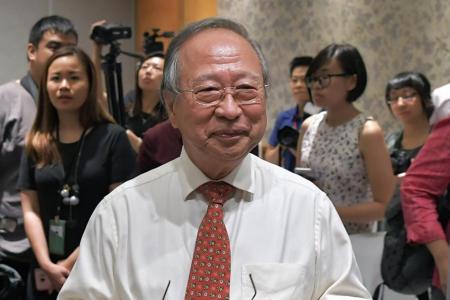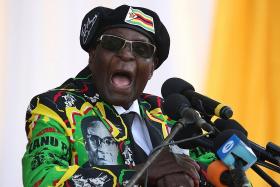High Court dismisses Tan Cheng Bock's legal challenge on elected presidency
High Court judge dismisses Tan Cheng Bock's legal challenge of whether Wee Kim Wee was first elected president
The High Court ruled yesterday that Parliament has the right to start counting from the term of former president Wee Kim Wee for purposes of reserving the upcoming presidential election for Malay candidates.
The reason is that the Constitution does not restrict Parliament to consider only presidents elected by Singapore citizens when deciding the timing of an election for a racial group, said Justice Quentin Loh.
It also allows the term of a president elected by Parliament, in this case Mr Wee, to be included in the five terms needed to trigger a reserved election.
Justice Loh made this key point yesterday when dismissing a legal challenge brought by former presidential candidate Tan Cheng Bock on the timing and basis of the reserved presidential election for Malays in September.
"From the perspective of ensuring multi-racial representation in the presidency... it makes no difference whether the president was elected by the electorate or by Parliament," he said in a 65-page judgment.
The Constitution was amended last year to allow elections to be reserved for candidates from a particular community, if no one from that community had been president in the past five terms.
The Government counted the first of the five terms as Mr Wee's term, as he was in office when the elected presidency took effect in 1991. There have been four other terms since, ending with current President Tony Tan Keng Yam.
Dr Tan said this was unconstitutional, and that the reserved election should take place in 2023 at the earliest and not this year.
His lawyer, Senior Counsel Chelva Retnam Rajah said Mr Wee's term should not be counted. He cited parts of the Constitution that referred to the president as someone elected by the citizens and serving a six-year term.
Mr Wee, he said, was elected by Parliament and served two four-year terms. This means Parliament can start its count only from the term of Mr Ong Teng Cheong, the first popularly elected president, he added.
Deputy Attorney-General Hri Kumar Nair, representing the Government, argued the articles in the Constitution on the reserved election did not specifically exclude presidents elected by Parliament. This means Parliament has "full discretion" to take into account Mr Wee's term, he added.
Justice Loh ruled the Constitution does not specify that only a popularly elected president can be considered in determining when an election should be reserved.
While the Constitution "reflects our prevailing constitutional arrangements at any given time" the over-arching definition of "president" has not changed since it was included in 1980, he said.
This definition, in Article 2, specifies the term "president" means any person elected president under the Constitution. Justice Loh noted the definition was retained through two major constitutional changes to the elected presidency: 1991 and 2017.
He said: "The fact that Parliament retained the definition... must be that the definition was of utility and valid because it would include presidents elected by Parliament.
"Otherwise, all the presidents before President Wee would no longer be presidents 'elected under this Constitution'... This would mean that all their acts, including all the Acts of Parliament to which they assented, would fall away."
Ultimately, Parliament is free to start the count from Mr Ong, any president after Mr Ong, as well as Mr Wee, he said and added: "Parliament's choice of the first term is a policy decision which falls outside the remit of the courts."
FOR MORE, READ THE STRAITS TIMES TODAY
Get The New Paper on your phone with the free TNP app. Download from the Apple App Store or Google Play Store now


